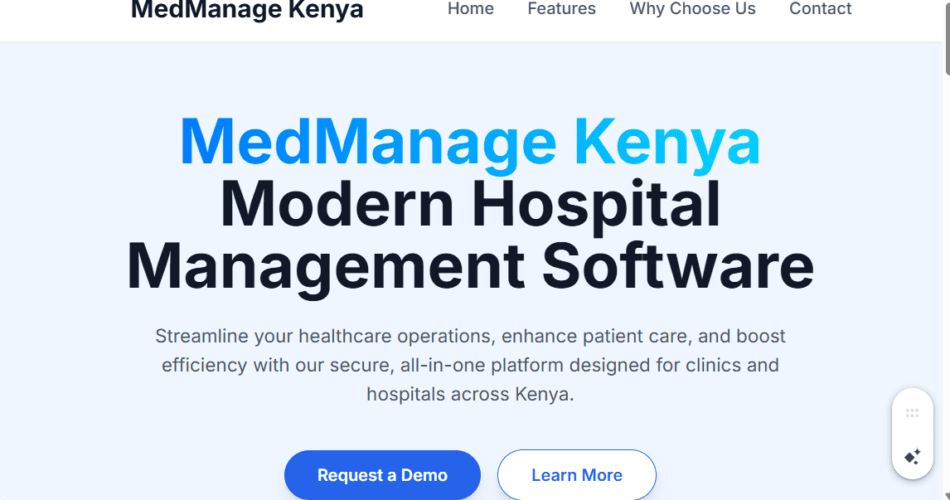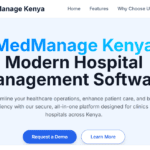Hospital Management Software Kenya
- Delivery Time2 Weeks
- English levelProfessional
- LocationUSA, United Kingdom, United Arab Emirates, New York, Nairobi, Kilimani, Dubai, CBD Nairobi, Canada, Australia
Service Description
The cost of Hospital Management Software in Kenya is 2000000KES .Get Hospital Management Software in Kenya at a price of 1500000KES at Black Shepherd Technologies.
Streamline your healthcare operations in Kenya with our comprehensive Hospital Management Software. Our all-in-one system digitizes patient records (EHR), automates billing, simplifies appointment scheduling, and optimizes inventory and pharmacy management. Boost efficiency, reduce errors, and enhance patient care with a secure and customizable solution designed for Kenyan hospitals, clinics, and health facilities.
In the rapidly evolving healthcare landscape of Kenya, an efficient and robust Hospital Management Software (HMS) is no longer a luxury but a necessity. The right HMS serves as the digital backbone of a healthcare facility, integrating all administrative, clinical, and financial processes into a single, cohesive platform. This comprehensive system is designed to address the unique challenges faced by hospitals, clinics, and other medical institutions in Kenya, from managing high patient volumes to ensuring regulatory compliance and data security.
A modern HMS for the Kenyan market goes beyond simple record-keeping. It is a powerful tool that transforms the entire patient journey, from the moment they first register to their final discharge and follow-up. At the core of such a system is the Electronic Health Record (EHR) module, which creates a secure, centralized digital repository for all patient data. This includes medical history, diagnoses, lab results, prescriptions, and treatment plans. By moving away from a paper-based system, healthcare providers can eliminate errors caused by illegible handwriting, reduce the risk of lost files, and ensure that a patient’s complete medical history is instantly accessible to authorized personnel, leading to faster and more accurate diagnoses and treatment decisions.
Beyond the clinical aspects, an effective HMS in Kenya is crucial for improving operational efficiency. The appointment scheduling module automates the booking, rescheduling, and cancellation of appointments, with automated reminders to reduce no-shows. This not only optimizes doctor and staff schedules but also significantly reduces patient waiting times and improves overall satisfaction. The billing and financial management module is another cornerstone of the system. It automates invoicing, tracks payments, and simplifies the complex process of managing insurance claims, including integration with key local providers like NHIF. This leads to faster reimbursement cycles, improved cash flow, and greater transparency in financial transactions.
Inventory and pharmacy management are also critical areas where an HMS delivers significant value. The software provides a real-time view of stock levels for medications and medical supplies, automates reordering when items run low, and tracks expiration dates to minimize waste. This is particularly important in a region where supply chain challenges can be a major hurdle. The system can also be integrated with the pharmacy, allowing doctors’ e-prescriptions to be sent directly, reducing dispensing errors and enhancing patient safety.
Furthermore, a well-implemented HMS in Kenya empowers hospital administrators and decision-makers with powerful reporting and analytics tools. The system can generate detailed reports on various key performance indicators (KPIs), such as patient inflow, bed occupancy, revenue trends, and staff performance. These data-driven insights are invaluable for making informed strategic decisions, optimizing resource allocation, and identifying areas for improvement.
The security and privacy of patient data are paramount. A reliable HMS in Kenya must be built with robust security features, including advanced data encryption, secure access controls, and regular backups, to ensure compliance with local and international data protection standards. Whether deployed on-premise or as a cloud-based solution, the system must guarantee the integrity and confidentiality of sensitive information.In addition to the core functionalities, a truly modern Hospital Management Software in Kenya extends its capabilities to embrace mobility and patient engagement. Mobile applications for patients are becoming a standard feature, allowing them to book appointments, view lab results, access their medical history, and communicate securely with their doctors from their smartphones. This level of patient empowerment fosters greater involvement in their own health management and improves communication with healthcare providers. Similarly, mobile apps for doctors and staff enable them to access critical patient information, manage schedules, and enter data at the point of care, whether at a patient’s bedside or in an emergency setting, thereby improving flexibility and response times.
Telemedicine and remote care features are also gaining significant traction, especially in a country like Kenya where geographical distances and travel challenges can be a barrier to healthcare access. An integrated HMS can facilitate secure video consultations, remote monitoring of patients with chronic conditions, and the digital sharing of diagnostic images and reports. This not only expands the reach of healthcare services to rural and underserved populations but also reduces the burden on physical hospital infrastructure.
For specialized medical fields, the software can be customized with modules tailored to specific requirements. For instance, a dental clinic module could include features for managing tooth charts and treatment plans, while a maternity ward module might track a pregnant patient’s journey from prenatal care to delivery and post-natal check-ups. This modular design allows the HMS to be a scalable solution, suitable for a small clinic with a few doctors as well as a large multi-specialty hospital with numerous departments.
Training and technical support are also crucial components of a successful HMS implementation in Kenya. A reputable provider will offer comprehensive training for all staff members, from front-desk receptionists to senior clinicians, to ensure seamless adoption and effective use of the system. Ongoing technical support, available locally, is essential to address any issues promptly and ensure the system remains operational 24/7. This includes regular updates to comply with new regulations or to introduce new features, ensuring the software remains a long-term asset to the institution. The choice between a cloud-based and on-premise solution also offers flexibility, with cloud-based systems providing lower upfront costs and easier maintenance, while on-premise solutions offer more control over data and customization, catering to the specific needs and infrastructure of different healthcare providers in the Kenyan market.
In conclusion, a modern Hospital Management Software in Kenya is a multi-faceted solution that brings together clinical excellence, administrative efficiency, and financial stability. It is a strategic investment that enables healthcare facilities of all sizes to streamline workflows, reduce operational costs, enhance patient care, and ultimately, build a more resilient and responsive healthcare ecosystem.








